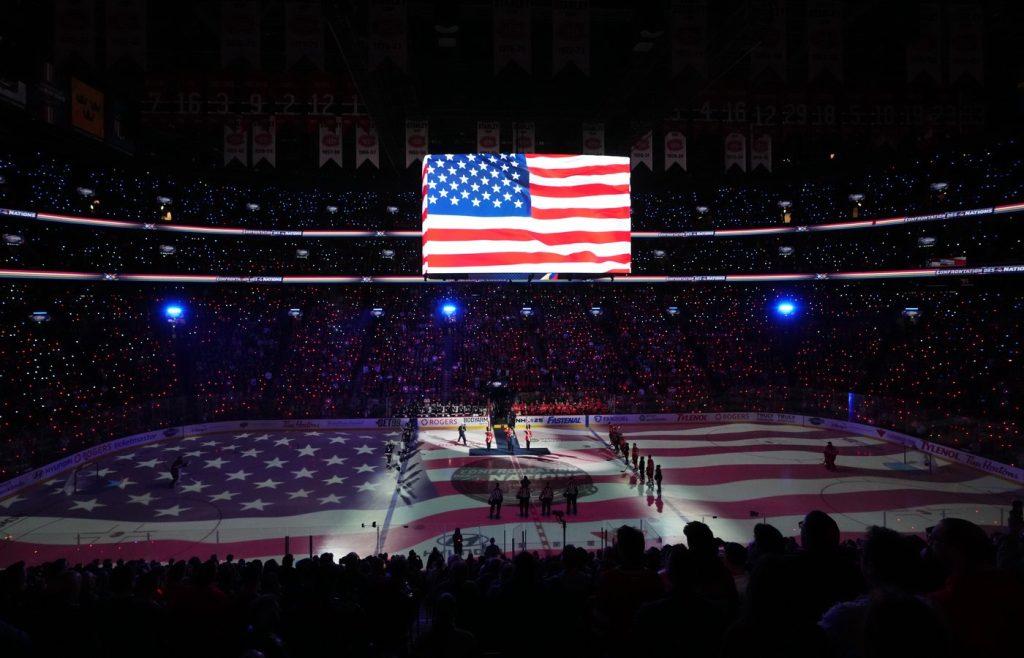Montreal became a focal point of sports and political tension as hockey fans booed the American national anthem prior to the highly anticipated matchup between Canada and the United States at the 4 Nations Face-Off, held on Saturday night, February 15, 2025. The event took place at the iconic Bell Centre, where the atmosphere was charged with competitive spirit and national pride.
As the Canadian team took to the ice, they were greeted with enthusiasm, receiving a hero's welcome led by legendary MMA fighter Georges St-Pierre. However, the mood shifted dramatically when warrant officer David Grenon of the Royal Canadian Air Force Band began to play "The Star-Spangled Banner." Fans in the arena responded with loud jeers, despite public address announcer Michel Lacroix's appeal for respect towards both anthems.
This incident marked another occurrence of the American anthem being disrupted during Canadian sporting events, reflective of the rising political tensions between the two nations in recent weeks. Jared Olsen, a fan from Lethbridge, Alberta, voiced his discontent about comments made by U.S. President Donald Trump regarding Canada potentially becoming the 51st state. "I don’t like that," Olsen remarked, expressing frustration over the political climate affecting sportsmanship.
In stark contrast, the atmosphere surged with pride when Grenon transitioned to "O Canada," prompting fans to join in a rousing rendition of the national anthem. The players followed this emotional display with an intense start to the game, as three fights broke out within the first nine seconds. Canadian players Brandon Hagel and Sam Bennett faced off against U.S. players Matthew and Brady Tkachuk, respectively, while Colton Parayko challenged J.T. Miller, escalating the excitement within the arena.
Audience reactions to the U.S. anthem have been increasingly negative at recent sporting events across Canada, including NHL games in cities such as Ottawa, Montreal, Calgary, and Vancouver, particularly following Trump's announcement of significant tariffs on Canadian goods. A similar trend was observed during games played by the Toronto Raptors, Canada's only NBA team. Kimberly MacDougal from Peterborough, Ontario, expressed disappointment over the booing, asserting that there should be a level of decorum maintained by the fans, regardless of their affiliations.
Although there was a month-long tariff pause negotiated earlier in February, the situation escalated when Trump imposed a 25 percent duty on all steel and aluminum imports from Canada. U.S. fan Jillian Gallagher from Chicago suggested that discontent with political issues might justify the booing, indicating that some Americans might feel similarly towards their own anthem under current circumstances.
While the booing of the U.S. anthem has historical precedence in Canada, such as during the 2003 invasion of Iraq, there have been recent games where respect for both anthems prevailed. For instance, last weekend, fans remained mostly silent during the anthems at two Montreal Canadiens games. Players and coaches from both sides have typically called for restraint among fans. Canada’s star player Connor McDavid emphasized the importance of respecting all anthems, a sentiment echoed by U.S. captain Auston Matthews.
As expectations rise for the continued hockey rivalry, the 4 Nations tournament is seen as a precursor to the NHL's return to the Olympics in 2026 after a hiatus from including NHL players in the previous two Games. After Canada's thrilling 4-3 overtime victory over Sweden and the U.S. dominating Finland 6-1 in their opening matches, the tournament is expected to intensify, with additional games set to take place in Boston.
Johnathan Bellotti, a U.S. fan, expressed anticipation that Boston crowds might respond with their own booing, further indicating the charged atmosphere surrounding the event. This shared history of political and sporting rivalry continues to shape the experience for fans and players alike in their encounters.










